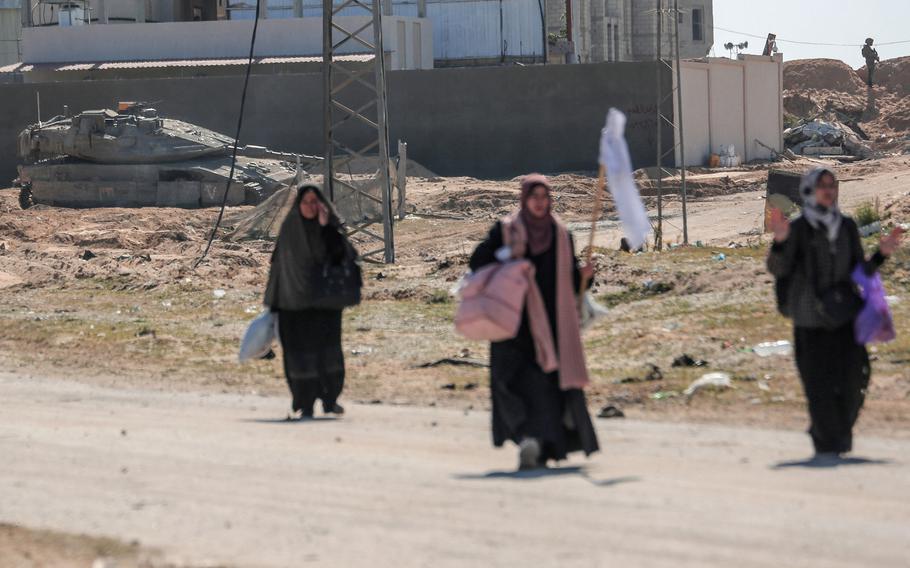
Displaced Palestinian women carrying their belongings lift a makeshift white flag as they walk past Israeli forces while fleeing the Hamad City area in Khan Yunis in the southern Gaza Strip on Tuesday, March 5, 2024, amid the ongoing conflict between Israel and the Hamas movement. (AFP/Getty Images/TNS)
Secretary of State Antony Blinken urged Hamas leaders to agree to a cease-fire deal that would free hostages and halt the war in Gaza, even as he called on Israel to let in more humanitarian aid for increasingly desperate Palestinians.
“It is on Hamas to make decisions about whether it’s prepared to engage in that cease-fire,” Blinken said Tuesday at the State Department in Washington. “It’s also urgent, irrespective of a cease-fire, to dramatically increase the humanitarian assistance getting to people inside of Gaza.”
Blinken spoke Tuesday alongside the Qatari prime minister, Sheikh Mohammed bin Abdulrahman Al Thani, who was in Washington for meetings as part of a broader U.S.-Qatar strategic dialog. Qatar has played a key role as mediator in efforts to win agreements from Israel and Hamas on hostage releases and a cease-fire.
A top member of Israel’s war cabinet, Benny Gantz, is also in Washington for meetings with senior U.S. officials, including scheduled sessions Tuesday with Blinken and Defense Secretary Lloyd Austin. It was unclear whether Gantz and Sheikh Mohammed had plans to meet with one another or jointly with Biden administration officials.
Blinken called the humanitarian situation in Gaza “unacceptable and unsustainable,” just days after scores of Palestinians were killed and injured Thursday during an outbreak of violence in which Israeli troops opened fire near a besieged convoy of aid trucks.
President Joe Biden, who has said the “aid flowing to Gaza is nowhere nearly enough,” said the outbreak of violence near the convoy could set back the cease-fire talks between Israel and Hamas, which is designated a terrorist group by the U.S. and European Union.
The U.S. and Jordan have resorted to using airdrops of assistance, which experts view as an inefficient and ineffective way to distribute aid compared with land crossings. U.S. Central Command said in a statement that it combined with the Royal Jordanian Armed Forces for a second airdrop on Tuesday, releasing more than 36,800 “meal equivalents in Northern Gaza, an area of great need.”
“Israel has to maximize every possible means, every possible method of getting assistance to people who need it,” Blinken said. “It requires more crossings, it requires more aid getting in. And once that aid is in, it requires making sure it can get to the people who need it.”
___
©2024 Bloomberg L.P.
Visit bloomberg.com.
Distributed by Tribune Content Agency, LLC.